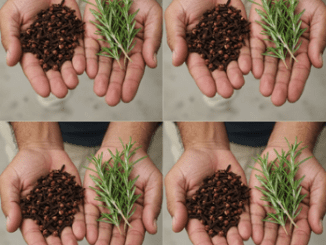A routine medical examination took a horrifying turn when doctors discovered a shocking condition caused by a simple yet critical cooking mistake. Dr. Sam Ghali, a renowned physician, recently shared an alarming X-ray image that revealed the consequences of consuming undercooked pork. His story serves as a stark warning to us all: maintaining food safety and hygiene isn’t just a suggestion—it’s essential for our health.
The Startling X-Ray Discovery

Dr. Ghali, known for his insightful posts on social media, described the incident as “one of the most insane X-rays” he’d ever seen. The patient had initially sought medical attention for persistent hip pain following a fall. However, what doctors found during their examination went far beyond a routine injury. The X-ray revealed the man was riddled with hundreds of tapeworm eggs, a chilling condition known as cysticercosis.
Cysticercosis occurs when a person consumes raw or undercooked pork contaminated with tapeworm larvae. Once ingested, the larvae enter the gastrointestinal tract and can travel to various parts of the body, forming cysts in muscles, soft tissues, and even the brain. In this case, the cysts were concentrated in the patient’s hips and legs, leading to his unusual symptoms.
What Is Cysticercosis?
Cysticercosis is a parasitic infection caused by the pork tapeworm, scientifically known as Taenia solium. This condition develops when tapeworm eggs or larvae infiltrate the body. While consuming contaminated meat is the primary cause, poor hygiene practices can also play a significant role in its spread.
Infections like this are more common in regions with poor sanitation or where pork consumption practices are less regulated. However, cases like this serve as a grim reminder that even in developed countries, lapses in food safety can have dire consequences.
Dr. Ghali explained that while the cysts in this patient’s muscles were not life-threatening, they posed significant risks if they traveled to the brain. “The real danger occurs when these cysts lodge in the brain, causing neurocysticercosis—a condition that can lead to seizures, confusion, and even death,” he warned.
The Dangers of Neurocysticercosis
Neurocysticercosis is a severe form of cysticercosis that occurs when tapeworm larvae reach the brain. It can cause a range of neurological symptoms, including:
- Persistent headaches
- Seizures
- Cognitive impairments, such as confusion or memory loss
- Loss of coordination
- Vision problems
In extreme cases, untreated neurocysticercosis can be fatal. While it is rare in regions like the United States, it is a significant public health issue in parts of Latin America, Africa, and Asia.
A notable case highlighted by The Sun involved a 52-year-old man from Florida who experienced severe headaches for months. After undergoing medical tests, fluid-filled sacs were discovered in his brain, leading to a diagnosis of neurocysticercosis. Despite living in a clean home and not traveling to high-risk areas, his love of “soft bacon” was identified as the likely cause.
How Tapeworm Infections Occur
Here's a video I made breaking down one of the most insane X-Rays I've ever seen#FOAMed pic.twitter.com/wp8xtGFTV5
— Sam Ghali, M.D. (@EM_RESUS) January 16, 2025
Tapeworm infections primarily result from consuming undercooked or raw pork that is contaminated with Taenia solium eggs or larvae. Once inside the digestive system, these larvae can migrate through the bloodstream to various tissues, forming cysts that can remain dormant for years.
The spread of tapeworm infections can also occur through autoinoculation—where individuals accidentally infect themselves due to poor hygiene. For instance, failing to wash hands thoroughly after using the restroom or handling contaminated food can lead to ingestion of the parasite’s eggs.
The Importance of Food Safety
Dr. Ghali’s shocking discovery underscores the critical importance of food safety practices, particularly when handling and preparing pork. To minimize the risk of tapeworm infections and other foodborne illnesses, consider these tips:
- Cook Meat Thoroughly
Always ensure pork is cooked to an internal temperature of at least 145°F (63°C), followed by a three-minute rest. Use a meat thermometer to confirm the temperature. - Maintain Cleanliness
Wash your hands with soap and water before and after handling raw meat. Clean all utensils, cutting boards, and surfaces that come into contact with raw pork. - Buy from Trusted Sources
Purchase pork from reputable suppliers or grocery stores that follow strict quality and hygiene standards. - Avoid Raw or Undercooked Meat
Avoid consuming raw or rare pork dishes, especially in areas where sanitation is questionable. - Practice Proper Hygiene
Good hygiene, including frequent handwashing, is essential to prevent the spread of parasitic infections.
The Broader Public Health Implications

While cysticercosis and neurocysticercosis are more commonly associated with regions that have limited access to sanitation, these cases highlight a growing concern about the global food supply chain. Dr. Eamonn Byrnes from Orlando Regional Medical Center noted that such infections were once considered nonexistent in the United States. However, isolated cases like these indicate potential public health implications.
“It is historically very unusual to encounter infected pork in the United States, and our case may have public health implications,” Dr. Byrnes explained. Increased awareness, education, and stringent food safety regulations are vital to preventing similar incidents in the future.
A Cautionary Tale
The Florida man’s story, coupled with Dr. Ghali’s shocking X-ray discovery, serves as a cautionary tale for all of us. Whether it’s a lifelong love of soft bacon or a one-time mistake in the kitchen, neglecting food safety can lead to life-altering consequences.

Conclusion
Dr. Ghali’s horrifying X-ray revelation is a stark reminder that food safety is not something to be taken lightly. From washing your hands to thoroughly cooking your meals, small actions can protect you from potentially devastating infections like cysticercosis. While rare, these cases demonstrate the far-reaching impact of seemingly minor oversights in the kitchen.
The next time you prepare a meal, take the extra time to ensure it’s done safely. It’s not just about flavor—it’s about protecting your health and the health of your loved ones. Because when it comes to parasites like tapeworms, prevention truly is better than cure.


